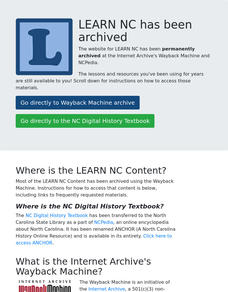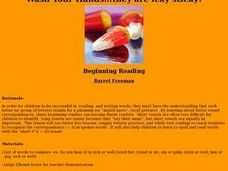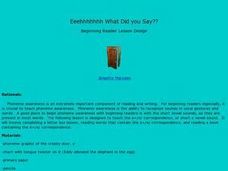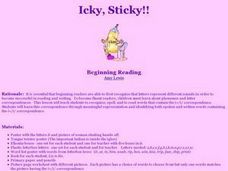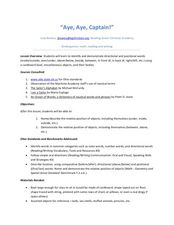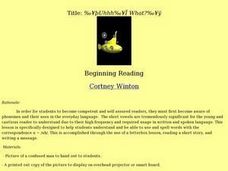Curated OER
Can you Top That?
Students make connections between their own experiences and the story, "get" the author's message and be able to discuss it with other readers, and apply their reading skills and strategies. They predict what happens in the story,...
Starfall
Ee is for Egg
For this literacy worksheet, learners use the letter E in various contexts to increase letter recognition and spelling skills for related words.
Starfall
Uu is for Umbrella
For this printing practice learning exercise, students learn to form both upper and lower case Zaner-Bloser letter u. Students trace several examples before generating their letters in the boxes.
Curated OER
Letter Names
Students explore language arts by participating in a letter identification activity. In this word recognition lesson, students are shown a list of vocabulary terms which they practice reciting with their classmates. Students identify and...
Alabama Learning Exchange
Tornadoes
Students research tornadoes. For this weather activity, students construct a KWL chart on tornadoes and view the video National Geographic-Tornadoes. Students discuss the facts they learned from the film and complete the KWL chart.
Curated OER
Rainbow Spelling (Kinesthetic Approach To Encoding)
Second graders demonstrate their encoding skills by spelling words using color coded paper, match correct letters with the colored paper to spell the words in standard form, and self correct any errors made in the spelling with colored...
Curated OER
Grammar: Adjectives
In this adjective learning exercise, students read about adjective and articles, then find adjectives in sentences, complete sentences with adjectives from a word box, and complete a short assessment, finding adjectives and articles.
Curated OER
Comparatives
In this comparatives worksheet, students review and discuss adjectives. They define adjectives as words used to compare two things using superiority, equability and inferiority. They then complete six comparative prompts by creating...
Curated OER
Icky, Icky, Sticky!
Students explore phonemes in spoken words as well as their corresponding graphemes in written words. They practice the short vowels /i/ and /e/. Students perform activities to practice sounds. They identify pictures with a particular...
Curated OER
Wash Your Hands...they are icky sticky!
Students engage in an emergent literacy instructional activity that focuses on phonemic awareness and they practice corresponding the letter "i" to its long or short sound. This type of recognition has been found to be essential to...
Curated OER
Eeehhhhhhh What Did you Say??
Student read pseudo words containing the e=/e/ correspondence and recognize sounds in vocal gestures and words. They explore the e=/e/ correspondence, or short e vowel sound and complete a letter box activity, reading words that contain...
Curated OER
Icky Fingers
Students are introduced to digraphs so they can match letters to their phonemes. They recognize the short vowel i=/i/ in both spoken and written words by practicing reading and spelling words containing /i/. Elkonin Letter Boxes are...
Curated OER
Aaaaaaaaaa!!! You Scared Me!
Students practice the letter A sound in its different foms. They study a tongue twister that encompasses the letter A sounds. They use letterboxes and bags of letters to sound out different words with the a sound. They listen to a...
Curated OER
Math: Congruent and Similar Figures
Eighth graders use geo-boards to create similar and congruent figures and find their corresponding sides. Using the geo-board paper, they draw the shapes they create on the geo-boards. With partners,students create similar and congruent...
Curated OER
E-E-E-E-Extra E-E-E-E-Effort
Students listen to a tongue twister emphasizing the short e sound. They practice writing the letter e and attaching different words with that sound to it. They listen to a book about a dog that enhances the letter e. They write a...
Curated OER
Voicing and Syllable Length (Using Rubber Bands)
Students identify voiced and unvoiced sounds. They practice using short and long vowel sounds. They identify consonants only after paying attention to the length of vowels. They use rubber bands to help them determine the difference...
Curated OER
Doc on Top
Students recognize the short /o/ sound in written and oral words in this lesson. They say a tongue twister which emphasizes words with the short /o/ sound. They then listen to the story "The Big Top" and identify the words in the story...
Curated OER
Icky-Sticky
Students practice recognizing the connection between phonemes and letters with an emphasis on finding the short vowel /i/ in words. They each receive a Elkonin letterbox and a picture card with icky-sticky gum on it and the letter i.
Curated OER
Aye, Aye Captain
Learners investigate how correspondences appear differently in different words. They also recognize the difference between long and short vowels. Students study how these correspondences are spelled and pronounced differently.
Curated OER
Open Wide
Students recognize the short vowel o in written and spoken language. Through matching activities, students discriminate the short vowel o from the long vowel o. They associate the phoneme with its letter representation and identify the...
Curated OER
Doctor Check-Up
Students recognize the short vowel o in written and spoken language. Through matching activities, students discriminate the short vowel o from the long vowel o. They associate the phoneme with its letter representation and identify the...
Curated OER
Icky Sticky Inchworm
Students recognize the short vowel i in written and spoken language. Through matching activities, they discriminate the short vowel /i/ from other vowel sounds. Students associate the phoneme with its letter representation and identify...
Curated OER
"Whaaa" Said The Baby"
Young scholars recognize phonemes that correspond with the letters in the alphabet. They focus on identifying the short a, /a/ sound. They examine the way their mouths move when making the short a sound mimicking a baby's cry. In given...
Curated OER
Uhhh..What?
Students identify and become competent and in reading the letter u, pronounced /uh/. They also use and spell words with the correspondance u = /uh/ by the use of a letterbox lesson, reading a short story, and writing a message.







